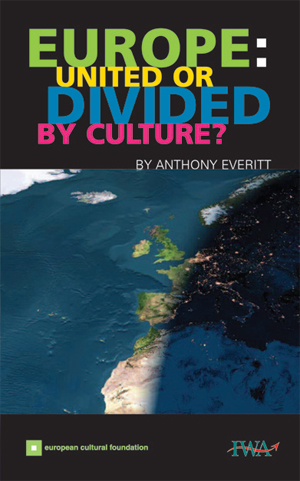
This booklet (just under 100 small pages of text) is a reflection drawing on a series of nine seminars held at Chatham House (The Royal Institute of International Affairs) from 2003 to 2005 entitled ‘Culture in an Enlarged Europe’. It provides a very readable and commendably lucid commentary on many of the key cultural issues which are being debated and acted upon in contemporary Europe. Towards the end of 2008, the EU’s ‘Year of Inter-cultural Dialogue’, its appearance is timely. One key theme is the current European mantra ‘united in diversity’ and the much debated ‘common European culture’. The text intelligently explores the pros and cons of a need for, or even the possibility of, a ‘European’ cultural policy and what that might be within an EU that has manifestly failed to attract the loyalty of its citizens.
All this is set within a context where the idea of homogeneous ‘national’ cultures existing within identifiable political or geographic borders is dying or dead (whatever the behaviour of EU member states might suggest they still like to think). The challenges of globalisation and migration on a major scale push choice and diversity ever higher up the agenda, altering the outlook of society and questioning some post-war assumptions about the 18th century Enlightenment roots of many common European values. Nevertheless, nationalism persists with people clearly preferring to invest loyalty in a visible entity rather than in ill-defined and elusive ideals. One of the regrettable possible effects of mass migration, it is suggested, is the fuelling of reactionary definitions of identity and culture that are inappropriate for the way contemporary culture is actually created, produced, disseminated and enjoyed.
For all the EU’s rhetorical claims, any European sense of identity continues to be extremely fragile, and indeed diversity of populations and cultures has long been a prominent feature of our continent – seen today in a renewed rise of regionalism (the ‘Jihad vs McWorld’ phenomenon so brilliantly set out by Benjamin Barber in his 1995 book of that title). It is odd that the EU Commission’s department responsible for culture is explicitly such a small and barely visible player (expenditure 7 cents per year per European citizen – annual budget smaller than a single year’s subsidy for an average-sized German opera house, we are told) whilst cultural policy in an implicit sense has been a major success story of Structural Funding and the growth of the creative industries, and is increasingly seen as important in relation to social integration and foreign policy as ‘soft power’.
There is an illuminating section on the growing influence of the English language (and what is being done to it as “the language of utilitarian communication”) and how others – the French in particular – are reacting. There are also interesting explorations of ‘us’ and ‘them’ in a spectrum of provision from high art to mass entertainment and self-representation through very local media outlets and difference within increasing urban standardisation. Given the complexity and inherent contradictions within the wide range of subject matter, the writing is helpfully clear and coherent. The conclusion probably rightly tries to be upbeat – returning to the notion of the arts as a key space where changing values can be tested, challenged and celebrated, and providing much of the developmental context for the EU’s ‘Lisbon Agenda’ as the 27 member states struggle with their place in a global economy and the Information Age.
The text is about much more than the just place of culture in the development of European identity and citizenship, and is recommended as a readable primer concerning complex and rapidly changing issues which the mainstream British media tend to ignore – except occasionally to ridicule them in the customarily insular and slightly yobbish way.
Review by Christopher Gordon, consultant in cultural policy.



